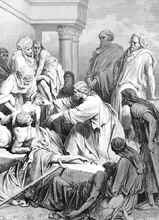THE TWELVE APOSTLES OF THE LAMB
Chapter One
Their Calling and Mission

The word Apostle means "one sent forth as a messenger," one chosen and sent with a special mission as the fully authorized representative of the sender. In the beginning of his ministry, Jesus looked for twelve such messengers whom he would teach and prepare to bring forth his special message of the Gospel. These twelve were Simon Peter, Andrew, James the brother of John, John, Philip, Nathanael who was also called Bartholomew, Thomas, Matthew, James the Less, Jude Thaddaeus, Simon the Canaanite and Judas Iscariot who was later replaced by Paul. Matt. 10:2-5
Jesus said that his heavenly Father guided and directed him to choose these twelve, and so he gave much attention to his close companions. Through his example and guidance, he taught them the truth and its importance, how to preach it and how to live it in their lives. These twelve Apostles were to be special witnesses of the persecution, death and resurrection of their master, Jesus. Because of this, they are known as the founders and special teachers of the Gospel Church. "I have manifested Thy name unto the men [the Apostles] which Thou gavest me out of the world: Thine they were, and Thou gavest them to me; and they have kept Thy word. Now they have known that all things whatsoever Thou hast given me are of Thee; for I have given unto them the words [the doctrine] which Thou gavest me, and they have received them... I pray for them: I pray not for the world, but for them which Thou hast given me; for they are Thine... Neither pray I for these [Apostles] alone, but for them also which shall believe on me through their word [the entire Gospel Church—to the end of the age]; that they all may be one [in heart and purpose and love]; as Thou, Father, art in me, and I in Thee, that they also may be one in us—that the world may believe that Thou hast sent me"—[to redeem and restore them]. John 17:6-9, 20 & 21 with quote from Reprint 1521-1522
When Jesus started looking for his twelve Apostles, he didn't look in the Jewish synagogues for the finely dressed, righteous acting scribes and pharisees. Jesus didn't look for his twelve among the rich rulers and popular public speakers of his day. No, Jesus looked for twelve men who were living and working in the humbler walks of life. Five were fishermen, one was of the despised publicans, and the occupations of the others are not mentioned. Reprint 1521 All, but Judas, were from Galilee and none of the original twelve received higher education. Acts 2:7 This should tell us something when looking at our brethren. The Lord often uses some of the most humble and meek brethren to carry out his grand eternal purposes. "...not many wise men after the flesh, not many mighty, not many noble, are called... that no flesh should glory in his presence." 1Cor. 1:26-29 These twelve men of humble means were chosen to live with the most magnificent of all God's creation, His only begotten Son!
Jesus blessed his Apostles with special gifts of the spirit to heal the sick. The Apostles could have used this spiritual wealth to acquire worldly wealth as many so-called preachers of the Gospel do today. But, no, they never accepted wages for their Gospel work. They chose instead to live humbly within their means. Sometimes they worked at different jobs, so they would have enough temporal means to work more in the Lord's spiritual service.
The Apostles lived very closely with God's Son for the three and a half years of his ministry, and yet, they didn't understand his real mission until after his death on the cross. They thought that Jesus had come at that time to set up an earthly kingdom with Israel as the ruling nation. But this was only part of Jesus' purpose which would be fulfilled almost 2,000 years after his death. No, Jesus tried to tell them over and over again that he was not sent to set up a temporal or national kingdom, but a spiritual one in heaven. He said, "My kingdom is not of this world." John 18:36 It was not until 50 days after Jesus' death, at what is called Pentecost, that the Holy Spirit of God came upon the Apostles, and they finally understood both Jesus' and their own mission. That mission was to call out a people for God's name by establishing a Church of believers in Jesus who would give up all to follow him. They realized then that Israel was just one part of God's plan, and that all of the previous experiences of Israel were designed to be a teacher to lead them to Christ. They also realized that Jesus had to die to pay the price for the sin of Adam—a perfect life for a perfect life. And, by witnessing the resurrection of their Lord, they realized that there would be more than just the kingdom promise of restored perfect life and all that was lost in Adam, but that there would be a spiritual resurrection of all who would give up their lives to be faithful followers of Jesus during the Gospel Age. The Holy Spirit at Pentecost also taught them that their message would cause great persecution upon Jesus' followers, just as it did their master. 2 Tim. 3:12
It is this mission of spreading the Gospel truth which the Apostles were sent out to accomplish. Because of their love for God, Jesus and their brethren, they lived, worked and died to bring us this message.
How all should love and respect their zeal for truth. All should be very grateful for their Bible messages to the Church. And all should thank God that He provided the twelve Apostles of the Lamb who are a strong foundation for the Church. Rev. 21:14